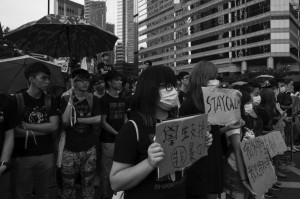Ryan Hendrickson, Staff Writer
China has one of the most oppressive governments in the world. The communist regime, which came to power in 1949 after a brutal civil war, has ruled the country with an iron fist. Protests and large public gatherings are forbidden, the Internet and television are tightly monitored and every year thousands of political activists are sent to prison, often never to be heard from again. This is the reality that over one billion people are forced to live with in Mainland China. In contrast, Hong Kong, a large self-governed city located just off the coast, has historically been an island of freedom and democracy, where voicing opinions and speaking out against the government is considered the norm. However, this past weekend thousands of Hong Kong citizens took to the streets to protest events that threaten to remove Hong Kong’s political freedoms. The protestors were met with tear gas and threats, making many wonder if the city’s long history of being a democratic haven may be coming to an end.

From 1841 to 1997, Hong Kong was governed as part of the British Empire. As a result, while Mao Zedong converted Mainland China into a communist dictatorship, the citizens of Hong Kong were spared this period of brutal oppression that many experts believe killed over 60 million. It was during this period of suffering in the rest of China that Hong Kong became a destination for those seeking freedom; Hong Kong’s population grew to over seven million people. In turn, foreign companies began investing in the city because it was the only place located near China that allowed capitalism, all of which led to Hong Kong becoming a very large and very vibrant city-state. However, throughout this period, the Mainland Chinese government was constantly pressuring the British to hand over the city, an eventuality that many Hong Kong residents dreaded.
Finally, in 1997, the British handed over the wealthy metropolis to the Chinese government. In order to ensure the continued economic and political freedoms of the city, the British and Chinese made a deal that would allow Hong Kong to remain semi-independent for fifty years. Under this deal, Hong Kong could remain a capitalist region, citizens would be allowed to elect their city’s leaders and many of the city’s historic political freedoms would remain in place. The deal came as a huge relief to the people of Hong Kong who had feared the takeover of the communist government. Now, less than 20 years since this deal was made, thousands of Hong Kong residents are taking to the streets in protest. The reason being that they believe the communist government is trying to break the 1997 agreement and increase its control over the city.
This belief stems from the fact that the Chinese government has claimed it must approve of all candidates that run for office in Hong Kong’s 2017 elections. For the people of Hong Kong, this direct Chinese control over the city’s government would mark the end of its independence. If China is allowed to pick city officials, it can ensure that those officials enact rules to benefit the Chinese government. Fearing this loss of independence, the people of Hong Kong have taken to the streets. For over a week they have blocked traffic and, generally, disrupted the daily functions of the metropolis. However, the head of the city government, whom many believe is a puppet of China, has refused to back down, instead sending in riot police to break up the protests. For now, Hong Kong remains locked in this bitter standoff, with both sides believing that the future of their city will be decided in the coming months.
Leave a Reply